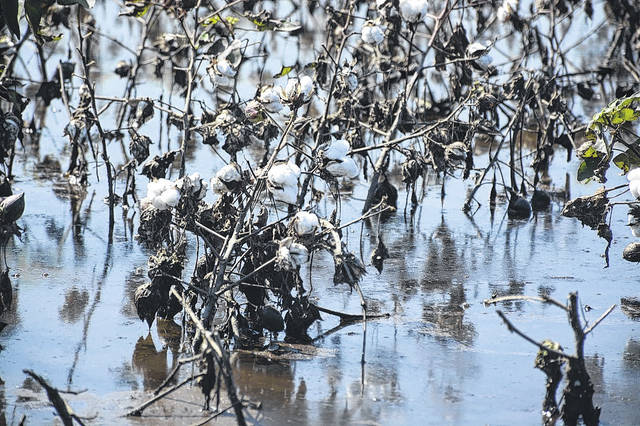LAURINBURG — Businesses were flooded and damaged; residences were hit in much the same way; and farmers were far from untouched as they began surveying their fields and crops.
In the aftermath of Hurricane Florence, State Commissioner of Agriculture Steve Troxler expects crop losses across North Carolina to be in the billions of dollars.
According to Scotland County Cooperative Extension Director Randy Wood, the local cotton crop was hit the hardest, with large losses expected after fields flooded just as cotton bolls were opening. He said fibers exposed to the severe amount of water Florence dropped can affect the cotton’s quality.
“Most of the remaining crops were severely damaged (but) luckily most of the corn has already been harvested, because that would have been devastating,” Wood said. “Cotton was hit severely — there’s going to be between 25 to 60 percent loss and that number might go up after the harvest, seeing what can and can’t be used.”
Besides cotton, soybeans will be taking a hit as well, though farmers are waiting to see how the crop recovers from the extreme amount of water. If the pod of the soybean sat in water, it could destroy the plant. But while Wood says there’s no doubt some crops will be lost, it’s impossible to say to what degree yet.
Peanuts and sweet potatoes will also be challenged,but not to as large a degree. The crops can handle sitting in water for two to three days, but longer than that, Wood says, they’ll begin to rot in the ground, causing a 100-percent loss of whatever area was flooded. Wood added that, usually, both peanuts and sweet potatoes recover pretty well from floods and water.
While different areas in the county got more rain than others and some crop is still under water, all farmers were hit by the storm in one way or another.
“There’s not going to be one farmer that will walk about without damage,” Wood said.
Customers will also be affected as well, according to the Cape Fear Farm Credit, saying there will be a spike in prices. Sweet potatoes have already jumped from $2 per carton to $14 or $15. There could also be a jump in cucumbers, squash, tomatoes and bell peppers.
In neighboring Robeson County, the farmers have suffered an incredible loss with an expected 99-percent of remaining harvest has been destroyed. State officials have also warned produce farmers if floodwater from a river or creek came in contact with the crops its illegal to use them for human consumption. The reasoning is because the floodwater could have been contaminated with human waste or other pollutants.
The United States Department of Agriculture Farm Service Agency has a disaster assistance program, with multiple programs for the various kinds of farmers and will do a formal assessment on the crops before disaster funds are available.



